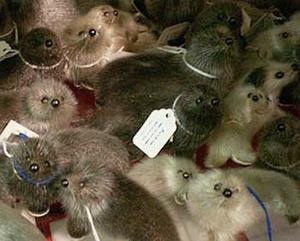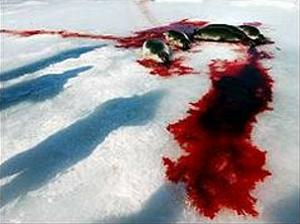 有鑒於動物福利方面的考量,歐洲部長理事會(European Council of Ministers)於27日通過歐盟區内海豹產品交易禁令的新規定。
有鑒於動物福利方面的考量,歐洲部長理事會(European Council of Ministers)於27日通過歐盟區内海豹產品交易禁令的新規定。
該條例涵蓋了所有海豹物種和其毛皮、内臟、肉、油、脂肪等可用作例如化妝品和藥品的各種副產品。
而爲了確保世代居住於加拿大阿拉斯加、格陵蘭、俄羅斯等地因紐特人(Inuit)的生計,他們從事傳統的狩獵行爲所捕獲的獵物製成的產品將視同唯一特例。但通融範圍也只限於以非盈利性的交易爲主。
此外,只要是偶發性並且產品所含物質純屬旅客個人使用的情況下,將海豹產品帶入關仍是合法的。
理事會公佈該項規定時表示,部份歐盟成員國已經通過或打算通過立法,以禁止海豹產品的貿易。同時該項規定「還將統一海豹產品銷售的法令,以避免歐盟區發生內部市場斷層和扭曲的現象。」
新法案在歐盟公報(Official Journal of the EU)刊登20天後生效。此外,為給予歐盟執委會(European Commission)和會員國充裕的時間準備必要配套措施,協調過的法規將在9個月之後生效。
 儘管加拿大政府聲稱捕獵海豹是人道的行爲,多年來,動物福利團體和保育人士卻不斷進行各式宣導活動,以期停止在他們看來是一個殘酷、不道德、也不可持續的做法。
儘管加拿大政府聲稱捕獵海豹是人道的行爲,多年來,動物福利團體和保育人士卻不斷進行各式宣導活動,以期停止在他們看來是一個殘酷、不道德、也不可持續的做法。
國際動物福利基金會(IFAW)表示:「捕獵海豹對加拿大微薄的財政貢獻,遠不及所需的間接補貼和捕獵過程中累積的成本。」
加拿大政府預估2009年商業性海豹捕獵的營收價值不到100萬美元之譜。反觀,加拿大政府卻預期加拿大和歐盟之間的貿易協定能增加260億美元的貿易額。
目前進行海豹捕獵的五個國家有:加拿大──該國為全球從事海豹捕獵的主要大國,以及納米比亞、格陵蘭、挪威、俄羅斯等國。挪威是加拿大的最大海豹出口市場。而挪威不是歐盟的成員國,因此不受新法規的影響。
In response to concerns about the animal welfare aspects of seal hunting practices, the European Council of Ministers today approved a new regulation that forbids the marketing of seal products in the European Union.
The regulation covers products derived from all species of seals and includes fur skins, organs, meat, oil and blubber, which can for instance be used in cosmetics and medicine.
The only exception will be products that result from hunts traditionally conducted by indigenous peoples of the Inuit homeland in Alaska, Canada, Greenland and Russia to ensure their subsistence, and those may only be marketed on a not-for-profit basis.
Import of seal products is allowed, provided it is of an occasional nature and consists exclusively of goods for the personal use of travellers.
In its announcement of the new regulation, the Council said that several EU member states have adopted or intend to adopt legislation prohibiting trade in seal products, and the regulation "will harmonize rules concerning the marketing of seal products so as to avoid fragmentation and distortion of the internal market."
The new act will come into force 20 days after its publication in the Official Journal of the EU. The harmonized rules will become effective nine months later, giving the European Commission and the member states time to put in place the necessary implementing measures.
While the Canadian government calls the seal hunt humane, animal welfare groups and conservationists have campaigned for years to end what they view as a cruel, unethical and unsustainable practice.
IFAW says, "The minute financial contribution of the seal hunt in Canada is more than offset by the indirect subsidies required and the costs incurred by the hunt."
The Canadian government placed the value of the 2009 commercial seal hunt at less than 1 million. By contrast, the Canadian government expects a Canada-EU trade deal to increase trade by 26 billion.
The seal hunt is practiced in five countries - Canada, where most of the world's seal hunting takes place, as well as Namibia, Greenland, Norway, and Russia. Canada's largest market for seals is Norway, which is not a member of the European Union and so is unaffected by the new regulation.







